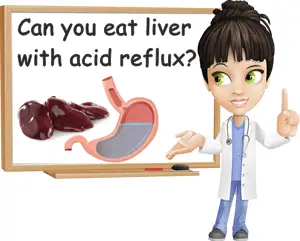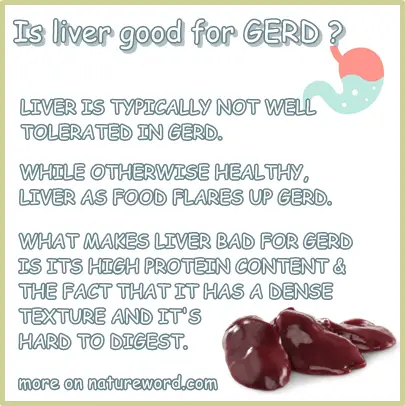Liver is a spectacularly healthy food, nutritionally dense and full of benefits for health. But is liver a good food to eat if you have GERD? Are there any benefits to eating liver for GERD? Or is liver something you should avoid if you have GERD? Will eating liver flare up your condition and cause acid reflux and heartburn or will it help treat it?
What is GERD?
GERD is also known as gastroesophageal reflux disease, acid reflux disease or simply acid reflux. It’s a digestive condition in which stomach acid escapes the stomach and rises up into the esophagus irritating and inflaming the mucous lining of the esophagus. The irritation and inflammation are felt as a burning pain sensation in the chest known as heartburn. GERD is typically a chronic condition and difficult to treat permanently.

What makes GERD hard to treat is the fact that it requires a strict diet, in addition to medication, lifestyle changes and other therapies. You cannot cure GERD permanently without making the necessary dietary changes. In a GERD diet, only certain foods may be consumed, primarily naturally bland-tasting foods, unprocessed or only minimally processed foods, light foods that are low in fat and also dietary fiber.
The choice of foods you can eat in GERD is also fairly limited, not to mention the fact that a lot of typically healthy foods are contraindicated which seems counterintuitive, to say the least. Spicy foods, acidic foods, fermented foods, aged foods, pickled foods, fried foods and heavily seasoned foods are all banned in a GERD diet because they cause acid reflux. If you have GERD, then even raw foods such as raw fruits, but also raw vegetables, and fruit and vegetable juices are to be avoided. Also see the article on cherries in GERD.
There is even a very specific list of otherwise healthy foods that are bad for GERD and best avoided altogether because they flare up symptoms and sabotage treatment efforts. Cucumber and tomatoes, pineapple and avocado, salmon and tuna, especially canned tuna, are commonly bad foods to eat with GERD.

Liver and GERD
One food that tends to flare up GERD and causes acid reflux after eating is liver. Irrespective of how it’s cooked, even if it’s left unseasoned, eaten by itself or paired with just absorbent white bread or white rice, liver as food triggers GERD symptoms.
Eating it with an active condition will lead to regurgitation of stomach juices and other stomach contents, causing mild to severe backflow and associated side effects. Symptoms commonly include a bad taste in the mouth, metallic, acidic, sour or vinegary, heartburn, apparent breathing difficulties during regurgitation of stomach juices, a sore throat post-regurgitation.
If you eat liver at night, at dinnertime, you will also experience acid reflux at night with coughing, heartburn and disturbed sleep.
Why is liver bad for GERD?
What is it about liver that makes it bad for GERD? As a food, liver is healthy and nutritious, but not good to eat if you have acid reflux disease.
Which is the case for so many otherwise healthy foods that are simply not tolerated well with the condition, for example, tomatoes and tomato sauce, juice and paste, bell peppers, cucumber, pineapple, avocado, lemons, garlic, onions, tuna, natural fermented yogurt, buttermilk, soured milk, pickles, fruit juices, cocoa and chocolate and more.When it comes to liver and acid reflux, some of its biggest nutritional benefits are what also make it bad for the condition.
More exactly, the high protein content of liver is the main reason why it causes acid reflux. The high content of protein in liver makes it harder to digest. Foods that are harder to digest stay in the stomach longer and that alone increases chances of regurgitation of stomach juices which causes an acid reflux episode.
Not just this, but the way liver is built makes it heavy on the stomach. Liver is quite a dense food and really heavy even by itself. So even if you don’t eat liver with onions, onion being a common trigger for acid reflux and highly contraindicated in GERD, or tomato sauce, or season it, or fry it, it’s still a high risk food for GERD and likely to flare up the condition.
Another example of a food similar to liver, as in healthy and highly nutritious, but with a high protein content and a dense makeup, is tuna. And you’ve guessed it: tuna is also a common trigger in GERD and causes acid reflux.
See also : Can You Eat Raw Liver?
Is liver good for GERD in any way?
While healthy, liver is one of those foods that are simply poorly tolerated by GERD sufferers, although it’s otherwise full of benefits for health.
See what are the benefits of eating liver. Just 100 grams of raw chicken liver gets you over 33% of your total daily protein requirements, and it’s quality, complete protein. The same amount also provides 366% of total daily vitamin A values for an adult and close to 7 times of all the vitamin B12 you need in a day. Find out more about the nutrition of chicken liver per 100 grams.
But there really isn’t any benefit specifically for GERD that you get from eating liver. That is, eating liver will not do anything for the condition, and especially not cure it. The only foods that are good for GERD, in the sense that they are well tolerated and do not cause acid reflux, are bland, unseasoned foods and light foods that are minimally processed and cooked lightly.
There is actually no such thing as a food that is good for GERD in the sense that it produces actual benefits for the condition and helps treat it permanently.When foods are labeled as good for GERD or presented as good to eat if you have frequent acid reflux episodes, it only means they are tolerated and do not elicit symptoms or flare up the condition. And that’s it.
